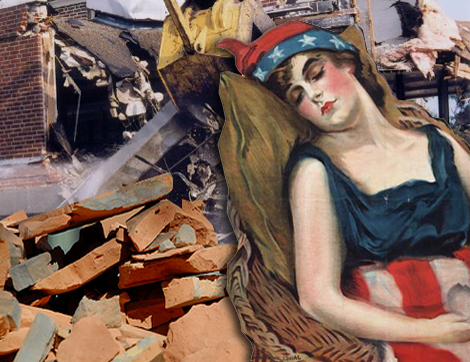
By Bill White
The streets of Roanoke, Virginia are a model of American economic collapse. Driving through the downtown, one passes abandoned storefronts with “for rent” signs in the windows, some of those signs old and curling from the long vacancies. Leaving the downtown in one direction, one comes to hundred-year-old housing, much of it abandoned, and city street corners crowded with prostitutes, pimps and drug dealers. Leaving in another direction, one passes the city’s crumbling passenger railway station and blocks of abandoned warehouses. Down the major commercial strip, one can see an abandoned shopping center and the row of abandoned stores that border it. Whatever direction one takes, one sees a city that is white and poor and desperate for a type of change that Barack Obama has been unable to deliver.
Roanoke is a city that was built by the railroad, and, until the 1970s, was run by the railroad and the industries, particularly coal, that depended on rail to bring their goods to American consumers. It is the only city with a population approaching 100,000 within 100 miles, and it is the banking, medical and commercial center of the Blue Ridge mountains. But its banking and medical industries don’t employ native Southern whites—they import doctors, often Jews from New York and New Jersey and Hindus from India, who live in a clustered and secluded part of South Roanoke around Carilion Roanoke Memorial Hospital, and who view the native whites as peasants to serve and exploit.
The discrepancy in income and class has found expression in city politics, where a recent mayor, Nelson Harris, once suggested Roanoke build itself by promoting a tourist industry that would provide minimum-wage service jobs to its largely unemployed white population. During the peak of the credit boom in the middle of the first decade of this century, Roanoke’s unemployment rate was over 8%, with another 7% of the population living primarily on government handouts—leaving about one out of three households without a single employed adult. And while the city’s population was declining until the past decade, when the federal government resettled a large number of immigrants from the poorest African countries in Roanoke’s decaying neighborhoods, the city was overwhelmingly, and is still, majority white.
The collapse of Roanoke mirrors the collapse of the American economy as a whole. In the mid-1970s, the heavy industry which had provided living wages to a largely uneducated white population began to be shipped overseas to Southern and Eastern Asia, a trend which accelerated during the Reagan administration, when interest manipulations combined with deindustrialization to destroy the agricultural base that supported the five sparsely populated countries that surround Roanoke itself. People began to leave the Roanoke area, and the city’s population fell from over 100,000 to 92,000 in 2000, with about 110,000 living in suburban Roanoke County, and perhaps 50,000 more in the five counties surrounding it.
In 2008, with the election of Barack Obama, a slew of extreme left-wing Democrats rode the president’s coattails into office, and Roanoke followed the nation’s trend with the election of David A. Bowers as mayor. But the election of a group of out-of-touch fringe activists, while hailed by the local newspaper, owned by a large publishing company financed from New York, did little to improve the city. Shortly after the 2008 election, one of Bowers’s running mates, Alfred Dowes, Jr., was convicted of federal corruption charges for accepting bribes, and as 2012 dawns, more than one out of three of the manufacturing jobs that used to employ men have fled the Roanoke River Valley.
Now, the city stagnates, as its mayor, a homosexual who tries to keep his problem quiet, spends city funds investing in more trees, citing a study saying that Roanoke is contributing to global warming by not recycling the carbon dioxide it produces. While millions go into the eco-fantasies of the privileged Yankee elite that live in isolation from the city’s working poor, those poor neighborhoods crumble, and Roanoke’s poor whites continue to suffer.
Bill White is a freelance journalist and publisher based in Virginia. He has also written articles for THE BARNES REVIEW (TBR) magazine. Bill is also the author of a new book entitled National Socialism: Yesterday & Today. Proceeds go to White’s legal defense fund.

